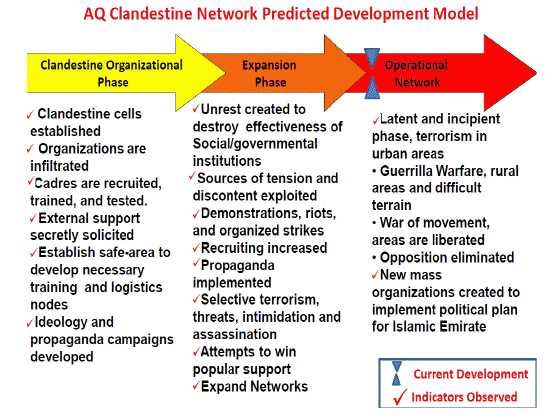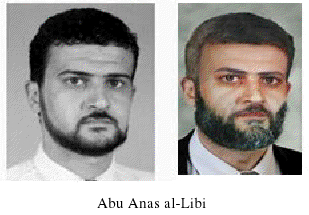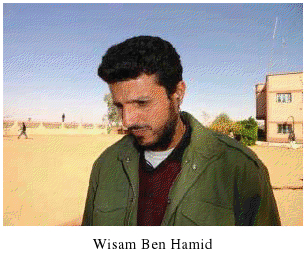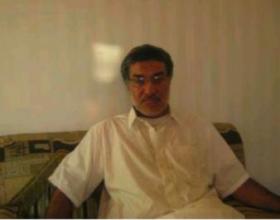An unclassified report published in August highlights al Qaeda’s strategy for building a fully operational network in Libya. The report (“Al Qaeda in Libya: A Profile”) was prepared by the federal research division of the Library of Congress (LOC) under an agreement with the Defense Department’s Combating Terrorism Technical Support Office.
Al Qaeda’s senior leadership (AQSL) in Pakistan has overseen the effort. AQSL “issued strategic guidance to followers in Libya and elsewhere to take advantage of the Libyan rebellion,” the report reads. AQSL ordered its followers to “gather weapons,” “establish training camps,” “build a network in secret,” “establish an Islamic state,” and “institute sharia” law in Libya.
Each part of this strategy is being implemented, and al Qaeda’s plan has advanced to the final stages. The three conceptual phases of an al Qaeda affiliate’s development are outlined in a chart prepared by the US military and shown here.

The chart shows that, according to the US military, al Qaeda’s operatives in Libya have already completed many of the tasks set forth by AQSL.
“AQSL in Pakistan dispatched trusted senior operatives as emissaries and leaders who could supervise building a network,” the report notes. They have been successful in establishing “a core network in Libya,” but they still act clandestinely and refrain from using the al Qaeda name.
The report finds that al Qaeda “will likely continue to mask its presence under the umbrella of the Libyan Salafist movement, with which it shares a radical ideology and a general intent to implement sharia in Libya and elsewhere.”
Senior terrorists and others involved in effort
Al Qaeda’s emir, Ayman al Zawahiri, has overseen the effort to establish a robust presence in Libya. Other senior al Qaeda operatives in Pakistan have also been involved. Abu Yahya al Liba and Atiyah Abd al Rahman, two top al Qaeda operatives who have been killed in drone strikes, helped guide the project prior to their demise. Some al Qaeda operatives have been tasked with taking over, or forming, katibas — or fighting battalions. Others oversee al Qaeda’s project and coordinate with senior leaders operating elsewhere.
The following al Qaeda operatives in Libya, as well as other suspected al Qaeda-affiliated individuals, are identified by name in the report:

Abu Anas al Libi is described as the “builder of al Qaeda’s network in Libya.” Other names listed for him include ‘Abd al Hamid al Ruqhay, Anas a Suba, and Nazih ‘Abd al Hamid al Rughi. Abu Anas was raised in Tripoli and moved to Afghanistan in the late 1980s, then followed al Qaeda to Sudan in the 1990s. He is “believed to have met Osama bin Laden.” In the late 1990s, Abu Anas “was granted asylum in Britain…but fled that country in 1999 to avoid arrest when he was convicted by an American court in relation to the 1998 terrorist attacks against US embassies in Nairobi and Dar es-Salaam.” He is an “al Qaeda-trained intelligence specialist” and “well trained in operational security.”
Abu Anas is “most likely involved in al Qaeda strategic planning and coordination between AQSL and Libyan Islamist militias who adhere to al Qaeda’s ideology.” Abu Anas and his fellow al Qaeda operatives “have been conducting consultations with AQSL in Afghanistan and Pakistan about announcing the presence of a branch of the organization that will be led by returnees from Iraq, Yemen, and Afghanistan, and by leading figures from the former LIFG.” (The LIFG refers to the Libyan Islamic Fighting Group, an al Qaeda-linked jihadist group formed in Libya in the 1990s.)
The report says that “intense communications” from AQSL in Pakistan are passed through Abu Anas in Libya.
Abd al Baset Azzouz was sent to Libya by Zawahiri and has been close to al Qaeda’s leader “since 1980 and first visited Afghanistan in the 1990s to join the mujahedin fight against the Soviet occupation.” Azzouz “has been operating at least one training center” and “sent some of his estimated 300 men to Brega to make contact with other militant Islamist groups farther west.”
|
|
|
Sufyan ben Qumu. |
Sufyan ben Qumu is a former Guantanamo detainee who has been tasked with training militia fighters. According to other published accounts, Qumu leads a brigade named Ansar al Sharia, but that is also the name of al Qaeda’s umbrella organization in Libya. Qumu was transferred from Guantanamo to Libya in 2007 and set free in 2010 as part of a general amnesty deal the Qaddafi government granted Islamists and jihadists.
Qumu has denied any links to al Qaeda in interviews with the press. However, the authors of “Al Qaeda in Libya” say the Ansar al Sharia battalion led by Qumu “has increasingly embodied al Qaeda’s presence in Libya, as indicated by its active social-media propaganda, extremist discourse, and hatred of the West, especially the United States.” Qumu has led a campaign of targeted assassinations, including against those opposed to al Qaeda.
Qumu is reportedly suspected of involvement in the attack on the US consulate in Benghazi on Sept. 11, 2012.

Hafiz al-‘Aghuri (aka Hayaka Alla) is “a close ally of Wisam Ben Hamid,” and co-leader of Katiba Dir’ Libya. Sitting in front of an al Qaeda flag, al-‘Aghuri recorded a video in which he rebutted the Libyan government’s claim that his battalion is insignificant, saying that “Dir’ Libya has secured the southeast border with Chad and Egypt without asking anything from the government.”

Wisam Ben Hamid “is a young rebel leader who allegedly fought in Iraq.” Two brigades, Katiba al-A’hrar Libya and Katiba Dir’ Libya, are reportedly under his control and both of them are “involved in postrevolutionary militia fighting in the Qaddafi stronghold Sirt and in Kufra in southeast Libya.” Ben Hamid “has been cited as one of the possible leaders of al Qaeda in Libya even though it is unlikely, given his prominence in the media, which contradicts AQSL’s usual penchant for secrecy.”
Abu Jandal al Libi is described as an al Qaeda “adherent” and “Libyan rebel.” Not much is known about Abu Jandal, but he sought guidance from al Qaeda’s legal forum. An al Qaeda theorist known as Abou Mouslim al Djazairi responded to Abu Jandal’s query, issuing a fatwa that he and his allies should secretly “form an organization bringing together sincere and loyal people” and should split from the Transitional National Council, which has “embroiled itself as well as all Libya in the swamp of servitude to the Crusaders.”
Ahmad Abu al Rashid (real name Nauri Husayn) fought in Yemen but has returned to Libya, via Somalia and Sudan. He is described as one of a group of “jihadist Salafists upholding al Qaeda ideology in Libya.” Jihadists “such as Abu al Rashid indeed control militias composed of hundreds of people,” the report reads. Abu al Rashid is among the “returnees from Afghanistan, Iraq, and Yemen, as well as elements of the former LIFG” who are “preparing to announce their presence after the conclusion of consultations with AQSL.”
Ansar al Sharia and the militias
The leaders listed above likely constitute a small fraction of al Qaeda’s overall presence in Libya. Citing media reports, the authors of “Al Qaeda in Libya” note that “a few hundred al Qaeda members must currently be operating in Libya.” The report continues by observing that “most of them are likely connected with three katibas — Ansar al-Sharia in Darnah, al-A’hrar Libya in Sirt, and Dir’ Libya in Kufra.”
These three katibas are just the most conspicuous, however, because of “their radical rhetoric and allegiance to the black flag, which symbolizes the commitment to al Qaeda-type militant jihad.”
In addition, the name Ansar al Sharia is used by multiple groups inside Libya. It is not just the name of individual battalions, but also may be al Qaeda’s new overall brand in Libya. Ansar al Sharia is being used by al Qaeda in Yemen, Tunisia and elsewhere to rebrand itself as an organization that represents true Islamic law. For example, the emir of al Qaeda in the Arabian Peninsula, Nasir al Wuhayshi, is also the emir of Ansar al Sharia Yemen.
The various Ansar al Sharia branches have their own social media sites, including in some cases Facebook pages. Their digital presences, while containing some differences, are also eerily similar. Much of the content and branding is the same, and they all praise senior al Qaeda leaders.
The three battalions identified in the report as most likely affiliated with al Qaeda are just the “tip of the iceberg.” In June 2012, Ansar al Sharia “staged a large-scale rally and military show of force involving dozens of military vehicles, with Islamists wearing the Afghan mujahidin’s traditional outfit.” The rally included “a parade in which some 30 battalions” from various Libyan towns participated “in the first meeting in support of sharia in Benghazi.”
In all, 15 militias attended the Ansar al Sharia rally. It is not clear how many are firmly within al Qaeda’s orbit, allied with the group, or otherwise positioned. Even if some of these militias are not staunchly allied with al Qaeda currently, they may cooperate or be co-opted by the group in the future.
“Al Qaeda in Libya” contains graphic evidence that al Qaeda-affiliated battalions have already acquired heavy armaments, including mobile rocket launchers and self-propelled antiaircraft guns. As al Qaeda’s clandestine network continues to acquire arms, the group will have more firepower with which it can target any dissenters, as well as the shaky Libyan government.
Al Qaeda is doing its best to destabilize the new post-Qaddafi government, seeing an opening to inculcate its radical ideology and organization during a time of uncertain transition. Al Qaeda is also exploiting tribal and ethnic conflicts, using them to “build alliances and support, especially in the south, where Arab tribes are fighting the Tubu (Tebu) African minority that straddles the Libya-Chad border.” One of the al Qaeda-connected battalions, Dir’ Libya, is fighting alongside the Arab tribes against the Tubu.
Connections to other al Qaeda franchises
Al Qaeda’s growing presence in Libya is not self-contained, but instead part of an international network. Al Qaeda operatives in Libya work with their counterparts in al Qaeda in the Islamic Maghreb (AQIM), a known al Qaeda affiliate, and other parties throughout North Africa and the Middle East.
Al Qaeda’s “clandestine network in Libya will probably continue to provide critical support to AQIM,” the report reads, “especially with regard to arms procurement and safe passage of militants, which are essential to sustain AQIM’s war in northern Mali.”
The report’s authors warn that Libya “may already have become the favorite destination for would-be jihadists in Syria.” Recruits from north Africa and Europe “are increasingly crossing Libya’s borders on their way to Syria, probably with the blessing of the current Libyan government.” Libya has long been tied to the jihadist network in Syria, as many of the al Qaeda fighters who transited through Syria to fight the US-led coalition in Iraq came from eastern Libya.
Although al Qaeda did not bring the Arab Spring, the terrorist group is seeking to capitalize on it. Al Qaeda “has tried to exploit the ‘Arab Awakening’ in North Africa for its own purposes during the past year,” the report reads.
A clandestine network in Libya is just part of AQSL’s plan.









14 Comments
The way you posted this entry, it makes it seem like Al Qaeda is so much interwoven into the country, that the words “Al Qaeda” and “Libya” might as well become synonymous with each other.
I wonder what the pro-war progressives have to say about the recent events in Libya? We have heard NOTHING coming from them. Although I would imagine showing them something like this would give make them be more in denial about the situation.
In fact, they are so silent you could hear a coin drop from across the street.
Was the removal of Qathafi really worth this much agro ? I say no. A classic case of the tactical over the strategic .
sundoesntrise: What is your point? You don’t do your research and yet you throw out accusations. This is a serious situation evolving in North Africa and there is a strong American military presence close by.
Qudaffi left a vacuum that will need to be filled by a society that will rely on itself or it will will be chaos. They will have to take matters in their own time and today they chased away the Ansar al Sharia. This is a beginning…
this information is a waste of the Governments time & taxpayers money. This so called Congressional Report could have easily been culled from the TLWJ & its many contributors months if not years ago.
Reports this morning (22-09-12) on the B.B.C. that ‘mobs’ in Benghazi have “stormed” militia bases in that city. The reports claims this action has been sparked by anger over the recent assassination of U.S. ambassador Christopher Stevens.
Report is filed on B.B.C. website under the headline “Libya: Islamist militia bases stormed in Benghazi”.
@sundoesntrise
For some reason, libyan foreign fighters were very active in Iraq, outnumbered only by the saudi foreign fighters. It is interesting that 3 million Libya provided more foreign fighters than 80 million Egypt.
http://www.nytimes.com/2007/11/22/world/middleeast/22fighters.html?pagewanted=all&_moc.semityn.www
Dan From AZ,
Well maybe before you throw out your accusations, you would do well to know I have done all my research since the start of this ill-advised military adventure. I don’t know what point you’re trying to make, my original post was not a critique of the author in any way. Al Qaeda has had a significant presence in Libya since February 2011 and it has only grown since then.
Now Dan, maybe you’re upset about what I said about the progressives. In that case, don’t you think the pro-war advocates should’ve at least done more research about the situation on the ground and the true identity of the fighters we helped out before they sent personnel and military hardware on such a big mission?
Passer by,
Yeah, I remember reading those type of statistics a while back. Libya is just across from Europe, next to Algeria, around the Sahel, it is a global outpost for Jihadists to go in either direction, towards Europe, or to Africa to go wage Jihad there. I always wondered why with all the information available to us, why we were so hasty to get involved in such a volatile and hostile pocket of the world, presumably to “save civilians”. Because when I noticed that other Arab dictators were allowed to freely slaughter their own people without fear of intervention, I became suspicious of the “humanitarian intervention” the pro-war progressives tried to label the war as.
@ Sund Said: In fact, they are so silent you could hear a coin drop from across the street. You hear that coin?
Then you said: “since the start of this ill-advised military adventure. I don’t know what point you’re trying to make, my original post was not a critique of the author in any way. Al Qaeda has had a significant presence in Libya since February 2011 and it has only grown since then.”
Yes, you said that. What ill-advised military adventure are you referring to? If McCain (a GOP hawk) had anything to do with it, we would have boots on the ground in Libya and Syria. You really want to send troops there? How many US lives do you want to waste there? How many years do you want to spend there? How much money do you want to spend rebuilding their infrastructure which is required when you intervene with a military presence? We have nothing to spend! We need to choose our fights carefully. We need to bomb Al Qaeda till the cows come home and this we agree on, I think. How we do it is the question. To get involved in every ME problem is just not a realistic position that the US can be in.
“Yes, you said that. What ill-advised military adventure are you referring to? If McCain (a GOP hawk) had anything to do with it, we would have boots on the ground in Libya and Syria.”
I can see very quickly that you are a partisan commentator, so naturally it’s more frustrating talking to you, but McCain has said with Syria and Libya many times over that troops on the ground would not be necessary, but that they should be on stand-by incase we need them for a special situation. Libya was not a partisan thing, war-mongers from both parties came together for the effort.
And yeah, you quoted me about what I said that AQ has had a presence in Libya since February 2011. Can you actually prove me wrong about that? I don’t even feel like posting up proof of such things (because you have no excuse for not looking up such material yourself), but I can post such material if you like.
You really want to send troops there? How many US lives do you want to waste there? How many years do you want to spend there? How much money do you want to spend rebuilding their infrastructure which is required when you intervene with a military presence?”
I never claimed any such things, Dan. The solution?Don’t intervene from the start! Problem solved.
“We have nothing to spend! We need to choose our fights carefully. We need to bomb Al Qaeda till the cows come home and this we agree on, I think. How we do it is the question. To get involved in every ME problem is just not a realistic position that the US can be in.”
Once again you are playing the role of the partisan hack. There is no room for disagreement on taking out Al Qaeda, but let me tell you this Dan: Handing them Libya, across from Europe, near the Sahel, a transit point for immigrants and militants from across the world, is no way to start when it comes to fighting AQ. We didn’t “beat them” in Libya, Dan, we handed them a huge victory, and we knew they were there and we didn’t even touch them.
@sundoesntrise/Dan from Az
Not only have ‘we’ “handed” Libya to AQ and their like minded associates/collaborators ‘we’ve’ also via our ally/non-ally(?), Egypt, allowed the Sinai to slip into limbo. Interestingly enough much in the same way El Salvador and Honduras allowed Chalatenango & to a lesser extent Lempira & Ocotepeque to become a rallying point(s)/platform(s) for the insurgency’s that came to envelope their nations & Central America At Large.
The US has also allowed for conditions, due to their gross mismanagement of disengaging from Iraq, for the North East sector (Turkey, Syria, Lebanon, Iraq) of the ME & that which is South of the Caucasus Mts to fall prey to elements whose interests run counter to whats best for the region & its people.
About time. But they are still dancing around the obvious close ties between the LeT and the ISI, and therefore by extension between the ISI and bin Laden. And the ISI is part and parcel of the Lybia military.
Therefore, until the Generals and their families abroad start to feel economic and travel pain from their terrorist activities, they will feel no pressure to stop their support for groups.
Other reason, libyan foreign fighters were very active in Iraq, outnumbered only by the saudi foreign fighters. It is interesting that Libya provided more foreign fighters Egypt
Not only have ‘we’ “handed” Libya to AQ and their like minded associates/collaborators ‘we’ve’ also via our ally/non-ally(?), Egypt, allowed the Sinai to slip into limbo. Interestingly enough much in the same way El Salvador and Honduras allowed Chalatenango & to a lesser extent Lempira & Ocotepeque to become a rallying point(s)/platform(s) for the insurgency’s that came to envelope their nations & Central America At Large.
@mike merlo: Exactly right. The only questions that remain are what form the blowback will take, when it will happen and where.